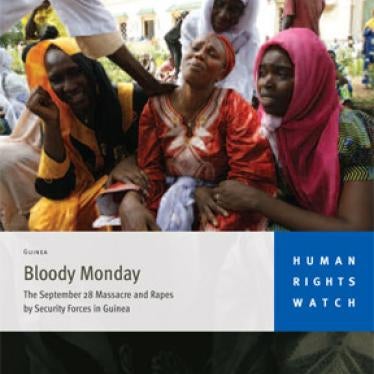(Washington, DC) - The winner of Guinea's hugely significant upcoming presidential election should urgently focus on rebuilding the rule of law and holding human rights abusers to account, Human Rights Watch said today. The first round of voting is scheduled for June 27, 2010.
The election will be the first real opportunity since independence in 1958 for Guineans to choose their leaders. A successful, credible election could finally end over 50 years of authoritarian and abusive rule, Human Rights Watch said.
"The human cost of Guinea's decades-long and vicious cycle of bad governance, violence, and impunity has been profound," said Corinne Dufka, senior West Africa researcher at Human Rights Watch. "Dismantling the architecture of impunity and building a society based on the rule of law will take time, but must top the agenda of both the incoming administration and Guinea's international partners."
Human Rights Watch interviews with scores of political party members, civil society leaders, and human rights groups in May and June suggest that since Guinea's transitional government came to office in February, allegations of violations of the key rights necessary for free elections have notably diminished. They include freedom of expression and peaceful assembly, freedom of association for political parties and movements, and protection from political violence.
Twenty-four candidates are competing in the first round of presidential elections, including four former prime ministers. A compressed timetable for the elections has generated some irregularities and some technical challenges. But the Defense Ministry's promise to keep the military in barracks during the election period, and to back whoever wins is a very positive sign, Human Rights Watch said.
For decades, rampant corruption and mismanagement of Guinea's vast natural resources has impeded Guineans' access to basic health care and education. Moreover, the prevailing culture of impunity has allowed members of the security forces and the political elite to commit egregious crimes - including torture, murder, rape, and embezzlement - without fear of being held accountable.
Violent crackdowns on opposition voices in recent years have taken hundreds of innocent lives and left many hundreds more injured. In 2006 and 2007, the excessive use of force by security forces against civilians demonstrating against deteriorating economic conditions left some 150 dead and 1,700 wounded. Human Rights Watch later documented a premeditated attack by elements of the army against opposition supporters gathered in a stadium in the capital, Conakry, on September 28, 2009. In that attack, some 150 to 200 Guineans were killed, over 100 brutally raped, and more than 1,000 injured. More than 100 bodies are still missing.
Once the election is over, the new government and Guinea's international partners should make reforming the country's justice system - characterized by inadequate resources, lack of independence from the executive, and corruption - a top priority, Human Rights Watch said. A credible and impartial anti-corruption commission is also essential to rein in Guinea's far-reaching corruption and poor economic governance, Human Rights Watch said.
"The new president and government will have their work cut out for them," Dufka said. "They should waste no time addressing the deep-rooted causes of years of crisis - endemic corruption, impunity, crushing poverty, and the inequitable distribution of natural resource wealth."







